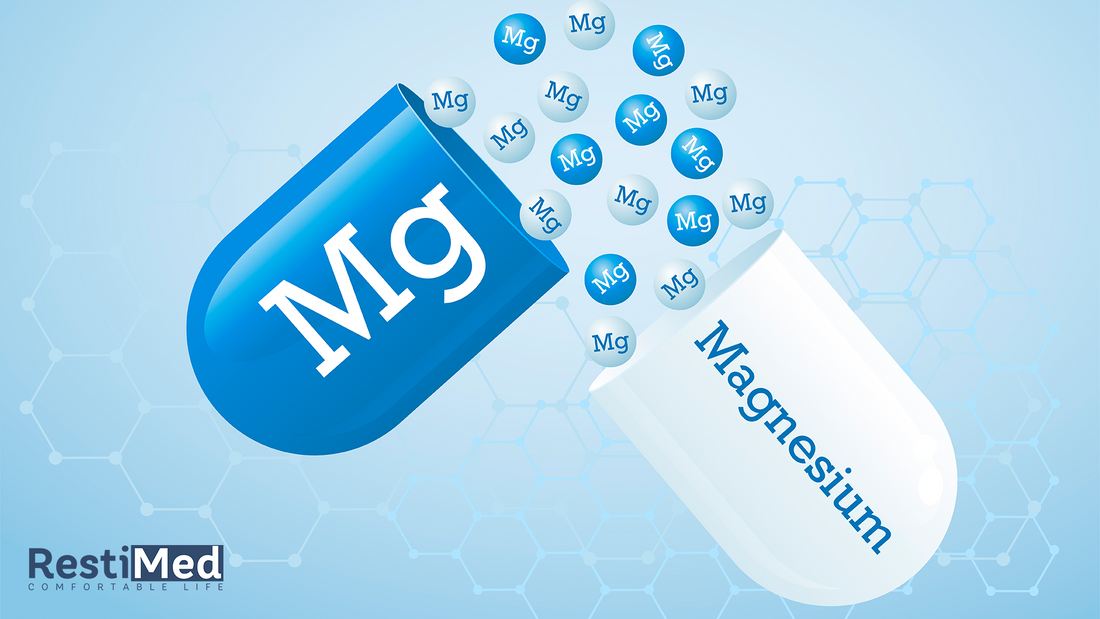
The Relationship Between Magnesium Deficiency and Restless Legs Syndrome (RLS)
Share
Restless Legs Syndrome (RLS) is a condition characterized by increased restlessness, tingling, and an urge to move the legs in the evening and night. It can interfere with sleep and daily life. Multiple factors, particularly iron metabolism, play a role in the development of RLS. Magnesium , which plays a role in neuromuscular transmission and sleep regulation, is frequently discussed: does magnesium deficiency exacerbate RLS? Below, you'll find an evidence-based yet concise summary.
What Does Magnesium Do in Our Body?
Magnesium, a cofactor for hundreds of enzymes, plays a role in nerve transmission, muscle contraction-relaxation, energy production, and the sleep-relaxation cycle. Deficiency can increase susceptibility to muscle cramps, and these symptoms can sometimes be confused with RLS. RLS typically relieves movement and worsens with rest; nocturnal cramps are characterized by sudden, painful contractions.
Magnesium and HBS: Summary of the Evidence
Current studies indicate that magnesium alone does not definitively alleviate RLS symptoms. However, there are small-scale studies reporting improved sleep quality and some symptom relief with supplementation in individuals with magnesium deficiency. Therefore, the approach should focus on "who is most likely to benefit?" rather than "everyone should take magnesium."
Who is More Likely to Have a Miscarriage?
- Those with irregular/inadequate nutrition
- Those using diuretics or PPIs for a long time
- In those with chronic alcohol use
- In those with malabsorption
- In athletes who sweat intensely
- Due to increased need during pregnancy and breastfeeding
If these groups have RLS symptoms, blood tests may be performed if necessary, following a physician's evaluation. Note: Serum magnesium levels may be normal but tissues may be low; interpretation should be made in conjunction with the clinical presentation.
Magnesium Supplementation through Nutrition
Nutrition is always the priority. Rich resources:
- Dark green leafy vegetables (spinach, chard)
- Nuts and seeds (almonds, cashews, pumpkin seeds)
- Whole grains (oats, buckwheat)
- Legumes (chickpeas, lentils)
- Dark chocolate (high cocoa)
- Avocado and banana
Choosing light, balanced meals instead of heavy/oily meals in the evening reduces the digestive load that can worsen nighttime complaints.
Considering Supplementation: Dose, Form, Timing
The need for supplementation should be discussed with a physician . The most commonly used dose range for adults is 200–400 mg of elemental magnesium per day (dose/safety in kidney disease and older adults is discussed separately). Commonly preferred forms:
- Magnesium glycinate: Generally well tolerated; evening use may be preferred.
- Magnesium citrate: Absorption is relatively good; it may have a mild laxative effect in some people.
- Magnesium oxide: Elemental ratio is high, absorption is relatively low; laxative effect may be more pronounced.
- Alternatives such as malat/taurat can be considered depending on personal response.
Taking it 1–2 hours before bedtime may positively impact the perception of sleep quality in some individuals. Avoiding large doses of minerals like calcium/zinc at the same time is better for absorption.
Security: Who Should Be Careful?
- Those with kidney dysfunction : Should not use without a physician's advice due to the risk of accumulation.
- Pregnancy/breastfeeding: Dosage should not be increased unless recommended by a physician.
- Drug interactions: May decrease absorption with some antibiotics and thyroid medications; a 2–4 hour interval is generally recommended.
- Those with a tendency to diarrhea : For citrate/oxide forms, it may be necessary to split the dose/select the tolerated form.
The Big Picture in HBS Management
Magnesium may be an integral part of RLS, but it is not the sole determinant. Clinical approach:
- Sleep hygiene (regular hours, cool/dark room, target 7–9 hours)
- Evening restriction of caffeine/nicotine/alcohol
- Movement breaks (short walk/stretch after long periods of sitting)
- Regular light to moderate exercise
- Evaluation of iron stores (ferritin, TSAT)
Summary
Magnesium plays a critical role in the neuromuscular system and sleep. Deficiency can exacerbate RLS symptoms; however, magnesium supplementation alone is not a definitive solution for RLS. The best results are achieved by combining evidence-based measures such as a balanced diet, sleep hygiene, trigger control, and iron assessment. The decision to supplement, dose, and duration should always be determined in consultation with a physician.
A Step to Help Support Your Sleep: Discover Restio
If nighttime leg rest is disrupting your sleep, and you're looking for medication-free, orthopedic support for your daily routine in addition to a medical evaluation, you might want to consider Restio . Restio is designed to help you feel relief from RLS symptoms (results may vary from person to person).
Go to product page →
Disclosure: This content is not medical advice; consult your doctor for diagnosis and treatment.
Source
- American Academy of Sleep Medicine (AASM) and IRLSSG publications: summaries of lifestyle and iron assessment in the management of RLS.
- Mayo Clinic Proceedings. The Management of Restless Legs Syndrome: An Updated Algorithm.
- Cleveland Clinic. Restless Legs Syndrome (RLS): Causes, Symptoms & Management.
- Small-scale clinical studies: findings on the effects of magnesium supplementation on sleep quality and muscle cramps.
